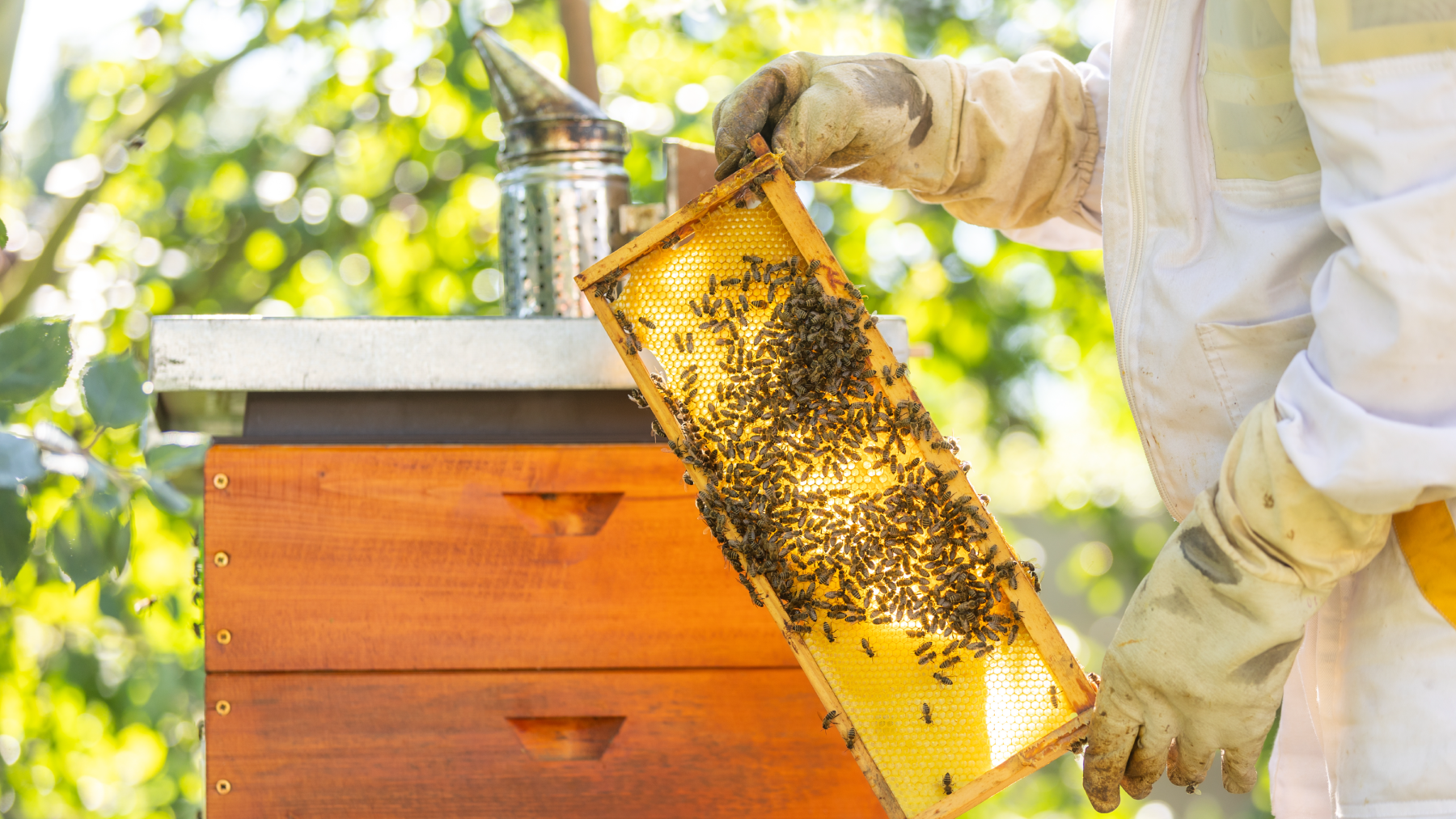
Environmental physiologist investigates how bees function and their role in our ecosystem
As graduate students, you constantly seek knowledge that can help contribute positively to our society. One of the most important topics we should pay attention to is the role of bees in our ecosystem. Bees have a crucial role in pollination, which helps in producing food for humans and animals alike. This conversation is a two-part interview about bees, bees and agriculture, and bees and food.
To kick off the series, we asked the first interviewee, Jon Harrison, a professor from the School of Life Sciences, about the importance of bees in agriculture. Harrison, an environmental physiologist who studies how insects function, interact with their environment and evolve, stated that bees play a crucial role in pollinating crops. Without bees, many crops stop yielding as much than they should, which would decrease food production. Bees aid in producing fruits, vegetables, and nuts, which are vital to human health. Additionally, he emphasized that bees are essential in maintaining biodiversity in agricultural ecosystems.
In the second story, we speak to another prolific bee researcher, Brian Smith, an inaugural Trustees of ASU professor and behavioral neuroscientist. In our conversation with Smith, he mirrored Harrison's thoughts on the importance of bees in food production. He emphasized that decreased crop yields would lead to food shortages and price increases. You can read the second part of the series here.
Jon Harrison
Professor, School of Life Sciences
Harrison is an environmental physiologist who studies how insects function, interact with their environment and evolve.
Hi Jon, it’s great to get to chat with you! Let’s kick this off with talking about your impressive academic and career background. You’ve done so much! Is there anything along your professional journey that has had a major impact on your research?
Absolutely! One is I like doing what people call "team science." We all have this vision of scientists working independently in the laboratory, and that's not how science moves forward these days. I like working with groups of people who bring different skills to work on a problem. So, right now, I'm here in Germany because I work with three other European researchers doing behavior genetics and fruit flies. They all have very different skills from my own. Still, it's fun to work with them because what we can do is way more exciting and relevant than anything I can do alone. An essential principle for anybody looking to research is that many important, interesting problems require people from different disciplines. So, I work with physicists, mathematicians, and geneticists, and I learned so much doing that.
So true! Dean Wentz has written about how crucial team science is to graduate education and beyond. Anyway, the field of bee research is quite robust and there are many avenues to get involved in – what are you focusing on specifically?
Well, specifically, I'm interested in the sense of smell; bees have a relatively acute sense of smell. I'm interested in finding out how that odor gets transduced into a pattern of electrical impulses that represent that smell at different levels of processing in their brains when exposed to a scent. It's surprisingly very complicated in bees, but similar to how it happens in our brains (in our brains, it's scaled up.) Then, when they learn something about an odor, what changes in their brain are related to encoding and memory? So, I'm focused on learning and memory research.
Several years ago, I began to realize that the way that people discern the toxicity of pesticides, fungicides, or heavy metals as they relate to animals and insects like honeybees is to do what's called an LD 50. The LD 50 tells you what dosage will kill 50% of the animals. Or they look for an LD 0, which looks at what quantity does not kill an animal, and they'll think, "Well, that has to be safe." Many of the electrophysiological, neural, and behavioral assays I work with show that some insects are susceptible to even sub-lethal doses of pesticide. In other words, even if it's not killing the bees, it makes them sick. It affects their behavior, which can be very important for our food supply when an animal pollinates many of our crops.
If bees cease, our meat supply might be challenged because bees must first pollinate much of the food we feed cattle. So bees are so important, and here we think we're using a measure that is not lethal — but not fatal does not mean that it doesn't affect them. It does. So, that's how I got into the issue in the USDA grant, where John is the lead principal investigator. But I have a role to play because I'm bringing in some non-lethal assays or some assays of sub-lethal effects.
That is so fascinating. That would essentially mean the same thing for humans, if we have pesticides in our food, it's not killing us per se, but it's doing something to us.
That's exactly right. Just because it's not killing us doesn't mean that it's not harming us. The harm can come 10 years down the road, the harm can come in any sorts of lethal effects that affect just about any part of our physiology. So it's probably more important than we know to try to eat food that isn't covered in pesticides but that it's very difficult. The problem is we don't want to pay for foods that are pesticide free because they're going to be more expensive.
Speaking of food, at the Graduate College we’re focusing on it a lot right now. We’re interested in learning about food production, scarcity and abundance. Can you talk about how bees and beekeeping intersect with the production of food and the environment and how it contributes to those issues?
Bees have to pollinate our crops; there's no question about that. They are the primary pollinators in the US, but many species of bees are not honeybees. There are native bees, and many of them will pollinate crops. Still, on a large-scale agricultural basis, you need honeybees because they're the ones that can be manipulated in large enough numbers to pollinate a crop effectively.
People flatbed semi trucks with a couple of hundred bee colonies strapped on the back of the truck; someone running a farm will hire someone to park their vehicle there for a week to pollinate their alfalfa. And if they don't, they won't get the alfalfa yield they need to make a profit. So, bees are marbled into agriculture; you cannot take bees out of agriculture right now. Hand pollination is an option if you want food to get really expensive… that won't work. So, bees are essential to pollination. They're just one of the critical species that are important to us for our food supply. Everybody thinks, "Well, bees make honey." Yes, bees make honey, which is important, but that's a minor part of what bees do.
You probably have a lot on your plate with your research – is that your main focus or do you have any career goals beyond that?
Well, at my age, my goal is to retire. I'm almost 70, so it's time to consider retiring. But my wife has been after me to start a podcast. I've got so many cool and exciting lectures and ideas I could talk about with biology. Many of the things we've discussed today could help people understand the relation of bees to agriculture. When I retire, I can transition into doing something that lets people know how dependent we are on biology.
Do you have any advice for students who are interested in your field or higher education?
If you love what you do, then persist. Everything you want to do has ups and downs. When I started my education, everybody said, "It's going to be hard to get into graduate school, then it's going to be hard to get a postdoc, then it's going to be hard to get a position. Well, guess what? I did it because I just loved it, and I persisted. If you do something just because you can, because it's easy, you will get frustrated because you might not like it. So it's worth the effort if you like what you're doing.
You have a background of working with the Graduate College on several incredible initiatives – can you tell us about that?
I developed the interdisciplinary graduate program in neuroscience through Graduate College about 18 years ago. That interested me because it would be a graduate program where we incorporated researchers from clinical neuroscience research units affiliated with neurosurgery programs, like at St. Joseph's Hospital. I thought, "Wow, this is the front line of neuroscience and it's a great experience we could bring to students." Also, I love doing international things, so I took a position at the Graduate College six years ago to help run international programs.
Read part one of the interview series with Brian Smith
More stories from the Graduate Insider

Graduate funding deadlines for Fall

How to feel confident in your next interview
Let’s be honest, interviews can feel nerve-wracking. Your palms sweat, your heart races, and you start to second-guess whether you even remember your own name. But here’s the good news: with a little preparation, you can walk into (or log onto) your next interview feeling calm, collected, and ready to shine.

